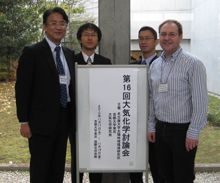2010 Press Releases
29.11.2010
New research links in atmospheric chemistry have been established between researchers at UCC and Tokyo Metropolitan University (TMU), Japan.
The research group at TMU, headed by Professor Yoshizumi Kajii, are renowned experts in field measurements of volatile organic compounds (VOCs) and their associated reactivity and impact in the atmosphere. VOCs are emitted from a range of natural (e.g. plants, trees, shrubs) and man-made (e.g. vehicle exhaust, solvent use) sources and subsequently react in the atmosphere to form a type of air pollution commonly known as “photochemical smog”. However, recent work has revealed large discrepancies between measured and expected concentrations of airborne VOCs in urban and rural environments, indicating that there are significant gaps in our knowledge of their sources and chemical reactivity in the atmosphere.
One of the principal objectives of the research collaboration is to utilise the measurement techniques employed by TMU in laboratory experiments of VOC oxidation performed under carefully controlled conditions in the atmospheric simulation chamber at UCC. It is envisaged that this approach will help to identify new chemical reactions in the atmospheric degradation of VOCs, thus improving our understanding of their environmental impact.
A team of four Japanese researchers will travel to Ireland in summer 2011 to perform these experiments in UCC. Details of the research were discussed during a recent visit to Japan by Dr John Wenger (Chemistry and ERI). During the visit Dr Wenger also gave the opening plenary lecture at the 16th Japanese Symposium on Atmospheric Chemistry, held at Tokyo Metropolitan University, November 17th-19th 2010. In his talk titled “Simulation Chamber Studies of the Atmospheric Degradation of Volatile Organic Compounds”, Dr Wenger outlined recent advances made in the atmospheric chemistry of VOCs and their effects on air quality and climate.
Picture L-R: Professor Yoshizumi Kajii, Dr Yoshihiro Nakashima, Dr Shungo Kato, Dr John Wenger

